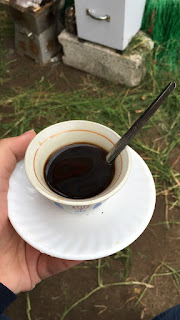This morning I woke up got started getting ready and then all of a sudden Hannah was knocking at my door. Opened the door and she started telling me that the LIVES project people were ready to go right now. If you know me personally, I am almost always wearing makeup and this morning I just didn't have time to put any on. But, it was okay! I got dressed and headed out to meet our driver Sintayeo and Dr. Solomon. We got into the Land Cruiser and away we went to the Rift Valley.
When we arrived in the town about two hours southeast of Addis, we stopped for coffee. Hannah and I both tried a cup of traditional coffee. It wasn't bad! It kind of tasted like tea mixed with coffee. After our 'coffee break' we went to the agricultural center in the town and met two experts. One of them was an artificial insemination technician and the other was an expert on dairy cattle. Our first stop was at an urban farm. Hannah asked some questions about their chickens and I asked a few questions about their two dairy cows. To my surprise, these two local dairy cows were producing around 4 liters a day, max.
Our next stop was at a village about 20 minutes from town. We were welcomed to a farm with about four different sets of grandchildren with one set of grandparents. All the children's parents were out working in the field. Hannah asked the main farmer (the woman) about her chickens and I followed up asking about the cattle. They only owned indigenous breeds because they did not have the management system or resources for the exotic breed, Holstein Friesian. The average milk yield for these cows each day was around 1.5-2 liters. They family were the only ones consuming the milk but I was not sure on what to advise the farmer to do to boost production.
Our next stop was actually in a field. The farmer was letting his indigenous cattle graze while his wife was working in the fields. I asked him a few questions and found his answers to be almost the same to last farmer's.
Our final stop for the day was at a family village. Four brothers all married and brought their wives to live and work on the 'family village'. All the men were working in the fields so Hannah was able to ask about the chickens they had while I played with the baby goat. Dr. Solomon and I had stepped back from Hannah's interview and started talking about dairy cattle here. He told me that the AI-conception rates were low, around 25-26% percent. The LIVES project even brought in synchronization tools, heat-detection patches, etc. but because the AI-technicians may be busy or the farmer may not really be sure whether the cow is in heat, they miss the cycle. Another factor may be bad semen. It is stored in liquid nitrogen tanks but improper storage in the tanks or misuse can cause the semen to go bad. The production in these rural areas is very low for several reasons. The breed is probably the number one factor. It's just a fact that Zebu cattle are just not as productive as the exotic breeds. But, the local cattle are more disease resistant and require way-less management. Whereas the higher producing breeds require a lot more management and are more susceptible to disease. So, how do we sort this out? As of right now, it is possible for there to be cross breeding between the local and exotic breeds. I've seen it before at previous farms that I have been to. The big issue that comes next in that is the problem of conception rates with AI.
So, as you see it's a continuing problem. They need more reliable AI services, quality exotic bull semen, and general knowledge. Everything always seems to lead back to knowledge. We know the problem so through several different projects that are currently being worked on can lead to solving those problems.
 |
| Yes, those are windmills! |
 |
| Pretty rooster! |
 |
| Traditional Coffee |
 |
| Corn! |
 |
| This is flooding. |
 |
| The local breed of cattle at the first village we visited. |
 |
| The family village. |
Tomorrow, we go to Debre Zeit to finish up my surveys! We will visit four farms and I'll be all set with my interviews! After that, I believe I'll be spending most of my time writing my final research paper. Two more weeks and then it'll be time to head home!





No comments:
Post a Comment